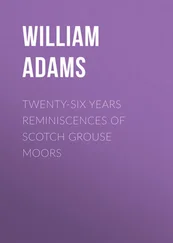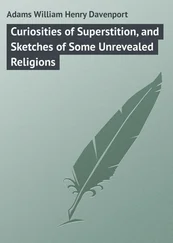William Adams - Witch, Warlock, and Magician
Здесь есть возможность читать онлайн «William Adams - Witch, Warlock, and Magician» — ознакомительный отрывок электронной книги совершенно бесплатно, а после прочтения отрывка купить полную версию. В некоторых случаях можно слушать аудио, скачать через торрент в формате fb2 и присутствует краткое содержание. Жанр: foreign_prose, foreign_language, на английском языке. Описание произведения, (предисловие) а так же отзывы посетителей доступны на портале библиотеки ЛибКат.
- Название:Witch, Warlock, and Magician
- Автор:
- Жанр:
- Год:неизвестен
- ISBN:нет данных
- Рейтинг книги:3 / 5. Голосов: 1
-
Избранное:Добавить в избранное
- Отзывы:
-
Ваша оценка:
- 60
- 1
- 2
- 3
- 4
- 5
Witch, Warlock, and Magician: краткое содержание, описание и аннотация
Предлагаем к чтению аннотацию, описание, краткое содержание или предисловие (зависит от того, что написал сам автор книги «Witch, Warlock, and Magician»). Если вы не нашли необходимую информацию о книге — напишите в комментариях, мы постараемся отыскать её.
Witch, Warlock, and Magician — читать онлайн ознакомительный отрывок
Ниже представлен текст книги, разбитый по страницам. Система сохранения места последней прочитанной страницы, позволяет с удобством читать онлайн бесплатно книгу «Witch, Warlock, and Magician», без необходимости каждый раз заново искать на чём Вы остановились. Поставьте закладку, и сможете в любой момент перейти на страницу, на которой закончили чтение.
Интервал:
Закладка:
The main object Dee had in view was the mastership of St. Cross’s Hospital, which Elizabeth had formerly promised him. This he never received; but in December, 1594, he was appointed to the Chancellorship of St. Paul’s Cathedral, which in the following year he exchanged for the wardenship of the College at Manchester. He still continued his researches into supernatural mysteries, employing several persons in succession as ‘skryers’; but he found no one so fertile in invention as Kelly, and the crystal uttered nothing more oracular than answers to questions about lovers’ quarrels, hidden treasures, and petty thefts – the common stock-in-trade of the conjurer. In 1602 or 1604, he retired from his Manchester appointment, and sought the quiet and seclusion of his favourite Mortlake. His renown as ‘a magician’ had greatly increased – not a little, it would seem, to his annoyance; for on June 5, 1604, we find that he presented a petition to James I. at Greenwich, soliciting his royal protection against the wrong done to him by enemies who mocked him as ‘a conjurer, or caller, or invocator of devils,’ and solemnly asserting that ‘of all the great number of the very strange and frivolous fables or histories reported and told of him (as to have been of his doing) none were true.’ It is said that the treatment Dee experienced at this time was the primary cause of the Act passed against personal slander (1604) – a proof of legislative wisdom which drew from Dee a versified expression of gratitude – in which, let us hope, the sincerity of the gratitude is not to be measured by the quality of the verse. It is addressed to ‘the Honorable Members of the Commons in the Present Parliament,’ and here is a specimen of it, which will show that, though Dee’s crystal might summon the spirits, it had no control over the Muses:
‘The honour, due unto you all,
And reverence, to you each one
I do first yield most spe-ci-all;
Grant me this time to heare my mone.
‘Now (if you will) full well you may
Fowle sclaundrous tongues for ever tame;
And helpe the truth to beare some sway
In just defence of a good name.’
Thenceforward Dee sinks into almost total obscurity. His last years were probably spent in great tribulation; and the man who had dreamed of converting, Midas-like, all he touched into gold, seems frequently to have wanted bread. It was a melancholy ending to a career which might have been both useful and brilliant, if his various scholarship and mental energy had not been expended upon a delusion. Unfortunately for himself, Dee, with all his excellent gifts, wanted that greatest gift of all, a sound judgment. His excitable fancy and credulous temper made him the dupe of his own wishes, and eventually the tool of a knave far inferior to himself in intellectual power, but surpassing him in strength of will, in force of character, in audacity and inventiveness. Both knave and dupe made but sorry work of their lives. Kelly, as we have seen, broke his neck in attempting to escape from a German prison, and Dee expired in want and dishonour, without a friend to receive his last sigh.
He died at Mortlake in 1608, and was buried in the chancel of Mortlake Church, where, long afterwards, Aubrey, the gossiping antiquary, was shown an old marble slab as belonging to his tomb.
His son Arthur, after acting as physician to the Czar of Russia and to our own Charles I., established himself in practice at Norwich, where he died. Anthony Wood solemnly records that this Arthur, in his boyhood, had frequently played with quoits of gold, which his father had cast at Prague by means of his ‘stone philosophical.’ How often Dee must have longed for some of those ‘quoits’ in his last sad days at Mortlake, when he sold his books, one by one, to keep himself from starvation!
After Dee’s death, his fame as a magician underwent an extraordinary revival; and in 1659, when the country was looking forward to the immediate restoration of its Stuart line of kings, the learned Dr. Meric Casaubon thought proper to publish, in a formidable folio volume, the doctor’s elaborate report of his – or rather Kelly’s – supposed conferences with the spirits – a notable book, as being the initial product of spiritualism in English literature. In his preface Casaubon remarks that, though Dee’s ‘carriage in certain respects seemed to lay in works of darkness, yet all was tendered by him to kings and princes, and by all (England alone excepted) was listened to for a good while with good respect, and by some for a long time embraced and entertained.’ And he adds that ‘the fame of it made the Pope bestir himself, and filled all, both learned and unlearned, with great wonder and astonishment… As a whole, it is undoubtedly not to be paralleled in its kind in any age or country.’
In the curious ‘Apologia’ published by Dee, in 1595, in the form of a letter to the Archbishop of Canterbury, ‘containing a most briefe Discourse Apologeticall, with a plaine Demonstration and formal Protestation, for the lawfull, sincere, very faithfull and Christian course of the Philosophicall studies and exercises of a certaine studious Gentleman, an ancient Servant to her most excellent Maiesty Royall,’ he furnishes a list of ‘sundry Bookes and Treatises’ of which he was the author. The best known of his printed works is the ‘Monas Hieroglyphica, Mathematicè, Anagogicè que explicata’ (1564), dedicated to the Emperor Maximilian. Then there are ‘Propæ deumata Aphoristica;’ ‘The British Monarchy,’ otherwise called the ‘Petty Navy Royall: for the politique security, abundant wealth, and the triumphant state of this kingdom (with God’s favour) procuring’ (1576); and ‘Paralaticæ Commentationis, Praxcosque Nucleus quidam’ (1573). His unpublished manuscripts range over a wide field of astronomical, philosophical, and logical inquiry. The most important seem to be ‘The first great volume of famous and rich Discoveries,’ containing a good deal of speculation about Solomon and his Ophirian voyage; ‘Prester John, and the first great Cham;’ ‘The Brytish Complement of the perfect Art of Navigation;’ ‘The Art of Logicke, in English;’ and ‘De Hominis Corpore, Spiritu, et Anima: sive Microcosmicum totius Philosophiæ Naturalis Compendium.’
The character drawn of Dr. Dee by his learned biographer, Dr. Thomas Smith, by no means confirms the traditional notion of him as a crafty and credulous practiser in the Black Art. It is, on the contrary, the portrait of a just and upright man, grave in his demeanour, modest in his manners, abstemious in his habits; a man of studious disposition and benevolent temper; a man held in such high esteem by his neighbours that he was called upon to arbitrate when any differences arose between them; a fervent Christian, attentive to all the offices of the Church, and zealous in the defence of her faith.
Here is the original: ‘Si mores exterioremque vitæ cultum contemplemur, non quicquam ipsi in probrum et ignominium verti possit; ut pote sobrius, probus, affectibus sedatis, compositisque moribus, ab omni luxu et gulâ liber, justi et æqui studiosissimus, erga pauperes beneficus, vicinis facilis et benignus, quorum lites, atrisque partibus contendentium ad illum tanquam ad sapientum arbitrum appellantibus, moderari et desidere solebat: in publicis sacris cœtibus et in orationibus frequens, articulorum Christianæ fidei, in quibus omnes Orthodoxi conveniunt, strenuus assertor, zelo in hæreses, à primitiva Ecclesia damnatas, flagrans, inqui Peccōrum, qui virginitatem B. Mariæ ante partum Christi in dubium vocavit, accerimè invectus: licet de controversiis inter Romanenses et Reformatos circa reliqua doctrinæ capita non adeo semperosè solicitus, quin sibi in Polonia et Bohemia, ubi religio ista dominatur, Missæ interesse et communicare licere putaverit, in Anglia, uti antea, post redditum, omnibus Ecclesiæ Anglicanæ ritibus conformis.’ It must be admitted that Dr. Smith’s Latin is not exactly ‘conformed’ to the Ciceronian model.
Читать дальшеИнтервал:
Закладка:
Похожие книги на «Witch, Warlock, and Magician»
Представляем Вашему вниманию похожие книги на «Witch, Warlock, and Magician» списком для выбора. Мы отобрали схожую по названию и смыслу литературу в надежде предоставить читателям больше вариантов отыскать новые, интересные, ещё непрочитанные произведения.
Обсуждение, отзывы о книге «Witch, Warlock, and Magician» и просто собственные мнения читателей. Оставьте ваши комментарии, напишите, что Вы думаете о произведении, его смысле или главных героях. Укажите что конкретно понравилось, а что нет, и почему Вы так считаете.











